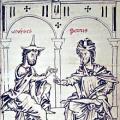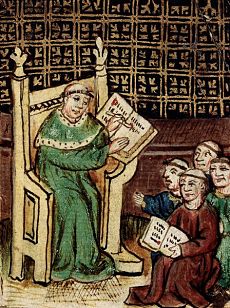223. Straw Men: The Rise of the Universities
The emergence of universities in Paris, Oxford, Bologna and elsewhere provide the main setting for medieval philosophy in the 13th century and beyond.
Themes:
• A.B. Cobban, The Medieval Universities: their Development and Organization (London: 1975).
• W.J. Courtenay and J. Miethke (eds), Universities and Schooling in Medieval Society (Leiden: 2000).
• F.C. Ferruolo, The Origins of the University: the Schools of Paris and Their Critics, 1100-1215 (Stanford: 1985).
• G. Leff, Paris and Oxford Universities in the Thirteenth and Fourteenth Centuries: an Institutional and Intellectual History (New York: 1968).
• O. Pedersen, The First Universities: Studium Generale and the Origins of University Education in Europe (Cambridge: 1997).
• H. de Ridder-Symoens (ed.), A History of the University in Europe. Vol. 1: Universities in the Middle Ages (Cambridge: 1992).
• I.P. Wei, Intellectual Culture in Medieval Paris: Theologians and the University, c. 1100-1330 (Cambridge: 2012).







Comments
secular masters and orders
The remark about "the secular masters who had not taken orders" at 21.00 is misleading. The "secular masters" were not members of religious orders (such as the Franciscan, Dominican, Benedictine, and so on). But they were almost all clerics who were in holy orders -- had received at least minor holy orders, and in the fac. of theology the "secular masters" were mostly priests. It's in the Italian universities where the fac. of arts was (unlike Paris and Oxford) primarily preparatory to the higher faculties of law and medicine as opposed to theology that the teachers were predominantly lay. One cannot equate the notion of "secular master" with that of lay as opposed to cleric, for the "secular masters" were overwhelmingly clergy in holy orders but who were not members of religious orders.
In reply to secular masters and orders by Michael Tavuzzi
Orders
Ok, good point - I expressed myself imprecisely there. I just wanted to say that they hadn't joined an order, but you're right that that isn't the same thing as taking holy orders more generally. I'll change that in the script for the book version, thank you for the correction!
In reply to Orders by Peter Adamson
I should add that I
I should add that I thoroughly enjoy your podcasts which I have been following for quite some time now. The email notifications of the new podcasts arrive here in Melbourne usually around 10.00 on Sunday nights and I enjoy listening with a nightcap...
In reply to I should add that I by Michael Tavuzzi
Down under
How nice! I actually upload them first thing in the morning German time on Sunday, partially because that means that the US audience (which is the biggest chunk of listeners according to my download stats) can wake up to find it already available. But it had occurred to me that it might be also good to do it that early so that Australians can listen before going to bed, so I'm glad at least one listener is doing so!
baccalaureate
Hello Peter,
I've been enjoying your podcast immensly. Your throuough treatment of Philosophy through all of its twists and turns through history is quite masterly.
In this installment on the Rise of the Univerities, you mention that the word baccalaureate may have originally been used to designate the "wreth originally worn on the head of an initiate".
I'm aware of the term bachoi used to designate initiates of the Mysteries of Dionysus as depicted in the Orphic Tablets, Plato, Euripides and other sources. Could you please elaborate on why and how you think this term was modified and adapted by the Medieval Universities? This is the first I have heard of this.
Sincereliy,
Scott Engel
In reply to baccalaureate by Scott Engel
Baccalaureate
Interesting you should ask this, because I almost included a longer discussion of it in the episode but then decided it was too complicated and maybe not of enough general interest. The thing that caught my attention is that some people think that the word has an Arabic source. This is argued in for instance:
R.Y. Ebied and M.J.L Young, “Did the Arabs Invent the University?” Times Higher Education Supplement 185 (May 2, 1975).
The idea is that “baccalaureate” comes from bi-ḥaqq al-riwāyat (“having the right to transmit” i.e. transmit your learning).
However I then read the explanation I give in the episode, which I think was in de Ridder-Symoens (ed.), A History of the University in Europe, but see also:
O. Pedersen, The First Universities: Studium Generale and the Origins of University Education in Europe (Cambridge: 1997), at p.263.
However I'd be curious to hear alternative explanations.
COLLEGE WOO!
It's interesting the parelles between the medieval university and madrasah colleges in the Islamic world. The emphasis on discussing authoritative texts as points of classroom discussion, degree as simply an authority to teach, the lack of distinction between secondary and tertiary education. Even the collegiate appearance of Al-Azhar, Qom or Qarawiyyin seem to resemble Oxford or Cambridge, even if they lacked a cooperate structure. I'm actually surprised that you didn't devote a whole episode to madrasahs considering the role they played in Islamicate intellectual culture. I'm curious, as a scholar of Islamicate philosophical culture, do you know of any works on medieval madrasahs and their relationship to the Latin university?
In reply to COLLEGE WOO! by Dick
Madrasas
Well, I did talk about madrasas quite a lot in the later Eastern episodes, probably would have been an episode's worth all together - but you're right that it could have merited its own episode. The book you are after is G. Makdisi, The Rise of Colleges: Institutions of Learning in Islam and the West (Edinburgh: 1981) - mentioned under "further reading" on episode 171.
In reply to COLLEGE WOO! by Dick
The Origin of the University
Sorry for being a Johnny-Come-Lately (I'm writing five years after the original podcast). I read with interest the observation that the medieval university seems to parallel the Islamic madrasah in some respects. The observation is certainly worth considering with serious analysis. It should be kept in mind, the differences, and the degree of those differences, between the medieval university and the Islamic madrasah are more numerous and of a far greater significance than the parallels. In other words, the similarities are superficial, but the differences are profound. A serious study of the subject would elucidate the points of divergence with sharper clarity.
music
What's the intro and outro music?
What is the music in the intro and outro?
In reply to music by DM
Music
Have a look under "Links" at the bottom of the page!
Add new comment